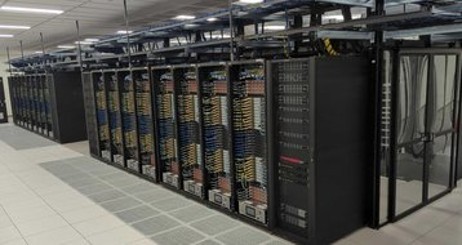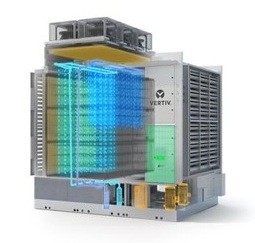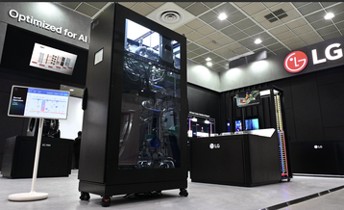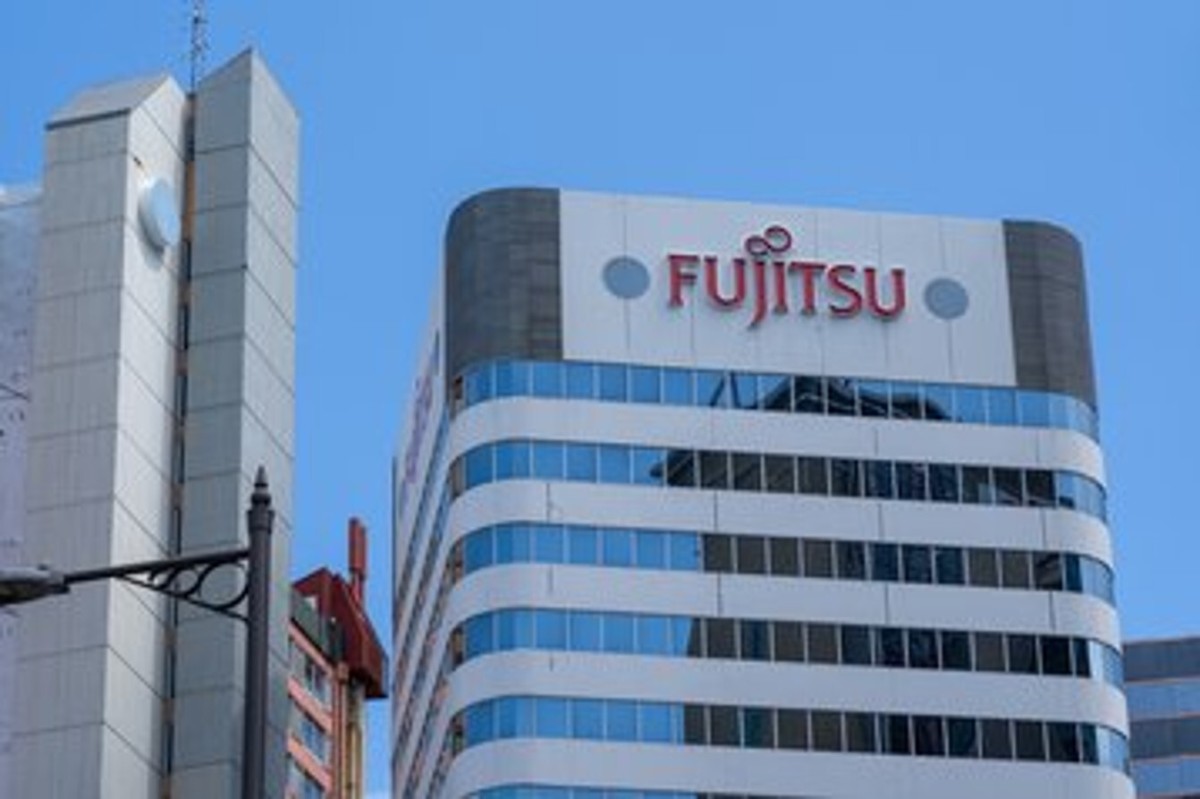BLOG
Vertiv launches modular prefabricated overhead infrastructure system 'SmartRun'
Critical digital infrastructure provider Vertiv has launched a modular prefabricated overhead infrastructure system known as Vertiv SmartRun. The company claims that the system can be deployed 85 percent faster on-site than traditional stick-build methods, allowing for installations greater than 1MW per day with just a single crew - not including offsite manufacturing times.
The system integrates the power distribution busbar, liquid cooling pipe network, hot-aisle containment, and network infrastructure into a single unit. It includes a secondary fluid network in its design, while prefabricated stainless steel piping systems are aimed at reducing the complexity of design, fabrication, and start up.
The system is aimed at fitting out a data hall, while competitor Schneider Electric has sold prefabricated shipping containers since 2022. This February, Nautilus announced its own prefab product backed by Overwatch.

Nvidia GB200s now available 'at scale' on CoreWeave
GPU cloud provider CoreWeave has made Nvidia GB200 systems available at scale. The company announced the wide availability of the Grace Blackwell systems on April 15. Early customers are already using the offering, including IBM, Mistral AI, and Cohere.
According to a blog post from Nvidia, CoreWeave has deployed "thousands" of Nvidia Blackwell GPUs, adding: "Systems built on Nvidia Grace Blackwell are in full production, transforming cloud data centers into AI factories that manufacture intelligence at scale and convert raw data into real-time insights with speed, accuracy, and efficiency.“
Cohere is using the GB200 systems for its personalized AI agents offering, North. According to Nvidia, the company is seeing up to three times more performance in training for 100 billion-parameter models compared with previous-generation Nvidia Hopper GPUs, even without Blackwell-specific optimizations, the company claimed.
CoreWeave began offering the Nvidia GB200 NVL72 instances in February of this year, initially from the company's US-West-01 region.
The GB200 NVL72-based instances on CoreWeave connect 36 Nvidia Grace CPUs and 72 Nvidia Blackwell GPUs in a liquid-cooled, rack-scale design, are available as bare-metal instances through CoreWeave Kubernetes Service, and are scalable up to 110,000 GPUs.
In March 2025, the company announced it would deploy a cluster of GB200s at a Bulk Infrastructure data center in Norway.

Vertiv launches new OCP-compliant power shelf, low-GWP cooling unit
New power shelf
Vertiv last week announced the launch of PowerDirect Rack, a 1U high-density 50V DC power system shelf.
The modular system scales up to 132kW per rack by integrating multiple power shelves, enabling expansion while minimising space requirements.
Built for Open Compute Project (OCP) ORv3 High Power Rack (HPR) environments, the hot swappable shelf supports both AC and HVDC input. It is available globally.
Vertiv introduces low-GWP cooling unit
The company recently announced an upgrade of its thermal management product portfolio with the introduction of the Vertiv Liebert EFC free cooling unit with low-GWP (Global Warming Potential) refrigerant.
The company said the solution is designed to meet stringent environmental standards – including EU F-Gas regulation 2024/573, and IPCC AR4 – for data center applications and is now available across Europe, the Middle East, and Africa (EMEA) with capacities ranging from 150 to 450kW.
Combining the capabilities of indirect air-to-air heat exchange and evaporative cooling principles in a single unit, the polymer heat exchanger and the new low-GWP inverter-driven compressor technology significantly enhance annual efficiency by up to 19 percent compared to previous technologies, allowing a pPUE (partial Power Usage Effectiveness) as low as 1.05.

Microsoft to use LG Electronics cooling infrastructure in some AI data centers
Microsoft plans to deploy LG Electronics' cooling infrastructure across an unspecified number of upcoming AI data centers. The partnership comes as LG Electronics this week launched a full suite of data center cooling solutions at Data Center World, packaging existing and new solutions together.
LG offers cold plates, coolant distribution units (CDUs), water-cooled oil-free centrifugal chillers, and computer room air handlers (CRAHs).
The company said that it will work with Microsoft to deploy LG's thermal management systems and chiller technologies at 'next generation' data centers. The size and scope of the deal were not announced.
At CES earlier this year, LG said that it would work with Microsoft on a number of AI efforts, including AI agents for various spaces, including homes, vehicles, hotels, and offices.
LG began more aggressively targeting the data center business last year, and said that it had signed a major deal for more than 100 chillers valued in the tens of millions of dollars for a data center project.

AMI unveils AMI Data Center Manager version 6.0, enhancing AI and GPU management in data centers
AMI, a global leader in dynamic firmware for worldwide computing, has announced the release of AMI Data Center Manager (DCM) version 6.0. The release delivers a host of new features, introducing new AI infrastructure and GPU management capabilities, support for new device types and server architectures, and additional capabilities that ensure data centers can efficiently manage their dense and diverse IT infrastructure.
AMI DCM v6.0 significantly broadens its scope with enhanced support for AMD-based servers and, for the first time, ARM-based servers from NVIDIA and Ampere. These additions highlight AMI DCM’s commitment to supporting a wide range of server architectures with a unique single-pane-of-glass solution for data center management that is device, vendor, and architecture agnostic.
Moreover, AMI DCM’s support for liquid cooling solutions addresses the thermal management needs of high-density GPU and AI deployments, ensuring optimal performance and longevity of the hardware.
And for the first time, AMI DCM features new, tiered feature-based licensing. This new licensing structure allows data centers of all sizes to customize and scale their solutions according to their specific operational needs and growth, facilitating cost-effective expansion and adaptation to evolving demands.
AMI DCM v6.0 is available immediately for deployment through AMI’s extensive global sales and support network.

Bitdeer acquires 40MW of Bitcoin mining containers from Saiheat
Blockchain technology company Bitdeer has acquired 40MW worth of liquid-cooled mining containers from Saiheat. According to a recent announcement, the newly acquired containers will host Bitdeer’s own proprietary mining rigs, known as the Sealminer, which are expected to be deployed in April.
Bitdeer continues to expand its Bitcoin mining operations after acquiring a 99MW site in Fox Creek, Alberta, in February of this year in an all-cash transaction.
Bitdeer currently has 175,000 Bitcoin mining rigs up and running, amounting to a total hashrate of 24.2EHps, and a cache of 114 self-mined Bitcoins. The company has multiple mining sites in locations spread around the globe, including Ohio, Norway, Ethiopia, and Bhutan.
Saiheat’s focus on developing new power and cooling solutions has seen the company develop several novel solutions in recent years, including a thermal module that recycles the heat emitted by cryptocurrency mining rigs.
Saiheat claims the nuclear-powered SMRs have no carbon footprint, and are “designed as a stable, high-capacity energy source. HEATNUC addresses the unique power needs of AI-driven infrastructure, providing a solution that traditional renewable and fossil-fuel-based energy sources cannot match.”

Fujitsu teams up with Supermicro, Nidec to launch data center energy efficiency initiative
A consortium of companies in Japan is partnering on a project to improve data center energy efficiency. Japanese IT services firm Fujitsu has partnered with US IT solutions provider Supermicro Inc. and Nidec, a Japanese electric motor manufacturer, on the initiative.
As part of the collaboration, the partners will combine Fujitsu's liquid-cooling monitoring and control software, Supermicro’s high-performance GPU servers, and Nidec’s high-efficiency liquid-cooling system to develop an integrated service to support the increase of data center power usage effectiveness (PUE).
In using Fujitsu’s liquid cooling technology, the partners expected to improve overall data center efficiency by up to 40 percent compared to air-cooled methods. The use of Supermicro’s GPUs aims to eliminate the need for air cooling fans, and Nidec’s cooling system is expected to improve thermal management and reduce overall power consumption. Nidec will also provide proprietary pump technology.
Fujitsu’s liquid-cooling monitoring and control software is also planned for installation at Fujitsu’s data center portfolio in Japan, with initial rollout starting in Q1 of fiscal 2025.

Google signs 10MW geothermal PPA with Baseload Capital in Taiwan
Google has signed its first corporate Power Purchase Agreement (PPA) for a geothermal project in the APAC region. The search giant inked a 10MW PPA with Baseload Capital in Taiwan. According to Google, the long-term PPA is aimed at catalyzing the geothermal market in the region and involves a direct equity investment in Baseload. The exact length of the PPA and size of the investment in Baseload were not disclosed.
Baseload is a Stockholm-headquartered energy investment agency that invests in and develops geothermal heat and power plants globally.
The company has been present in the Taiwanese market since 2019 through its subsidiary Baseload Power Taiwan.
Taiwan has a burgeoning geothermal sector. Due to its location on the Pacific Ring of Fire, the country has a significant geothermal potential, with studies showing estimates ranging from between 30 to 60GW of potential power.

South Korean gov’t announces increase in chips industry support package amidst incoming US tariffs
The South Korean government has announced it is increasing the support package on offer to the country’s semiconductor industry from $18.2 billion to $23.3bn. The government also said it would increase the amount of money available from a financial assistance program specifically targeted at the chip sector from $12bn to $14bn.
The government first proposed the establishment of a domestic CHIPS Act to mitigate the potential risks from the tariffs President-elect Trump has been threatening to impose since November 2024 - Trump told reporters in February: “It’ll be 25 percent and higher, and it’ll go very substantially higher over the course of a year.”
South Korea has been financially supporting the country’s semiconductor industry since 2021, pledging at the time to spend $451bn on domestic semiconductor production over the next decade through a mixture of government support packages, tax incentives, and corporate investment pledges.
The country is home to the two largest memory chipmakers in the world, SK Hynix and Samsung Electronics. Both are also among the top ten biggest semiconductor companies globally, and Samsung is one of only two manufacturers, along with Taiwan's TSMC, capable of producing leading-edge CPUs and GPUs.

OpenAI's Stargate eyes European expansion, but after US success
OpenAI's data center joint venture Stargate could launch in Europe in the years to come. The Financial Times reports that the UK is the current frontrunner for building a regional Stargate, but discussions appear to be at a very early stage.
Stargate - backed by SoftBank, Oracle, and MGX - plans to spend some $100 billion over the next year on data centers, and a record $500bn over the next four years. All of that infrastructure is set to be developed in the US.Only if and when that effort has proved successful does OpenAI plan to look further afield.
The UK currently seems attractive to OpenAI, given Prime Minister Keir Starmer's push for AI data centers, including an effort to improve access to power.
Intentional leaks by OpenAI and others could be used to try to play nations off against each other in search of favorable tax deals and lower regulations.

Leave A Reply
LOGO
This stunning beach house property is a true oasis, nestled in a serene coastal community with direct access to the beach.
Opening Hours
Monday - Friday : 9AM to 5PM
Sunday: Closed
Closed during holidays
Contact
+18888888888
hezuo@eyingbao.com123 West Street, Melbourne Victoria 3000 Australia



